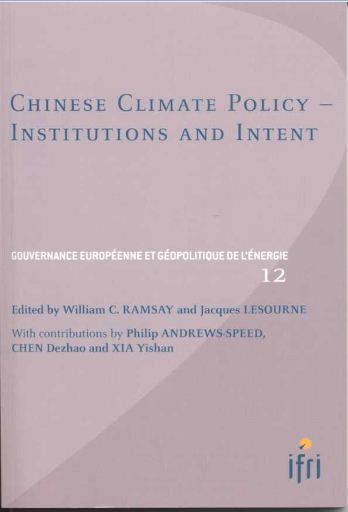Chinese Climate Policy: Institutions and Intent

Until the late 1990s, the balance of Chinese energy production and consumption was treated by the rest of the world as a net figure. No one knew what was going on inside the Chinese economy - it was a black box. As far as anyone was concerned, the Chinese would not soon be a major factor in world energy markets.
Energy policymakers realized how totally blind they were in 2004 when Chinese electricity production could not keep up with internal demand and the world experienced a surge in liquids demand as Chinese entrepreneurs fired up generator sets across the economy.
No country has confronted the need to collect data and formulate coherent policy for nearly a billion and a half consumers. A number of institutional arrangements have succeeded each other until now, when stronger energy policy and administrative functions of the National Development and Reform Commission (NDRC) are gaining traction. NDRC vice-chairman Zhang Guobao has maintained a steady hand on Chinese energy-policy evolution for several years - overseeing the increasing coherence of Chinese domestic and international energy policy - but the tension with powerful state enterprises and other vested interests still effectively defies efforts to truly centralize Chinese national-level energy policy and program authority.
This study identifies the nature of the forces that drive or constrain change within China’s energy sector, and explores the Chinese approach to climate change.

Available in:
Regions and themes
ISBN / ISSN
Share
Download the full analysis
This page contains only a summary of our work. If you would like to have access to all the information from our research on the subject, you can download the full version in PDF format.
Chinese Climate Policy: Institutions and Intent
Related centers and programs
Discover our other research centers and programsFind out more
Discover all our analyses
RAMSES 2024. A World to Be Remade
For its 42nd edition, RAMSES 2024 identifies three major challenges for 2024.
France and the Philippines should anchor their maritime partnership
With shared interests in promoting international law and sustainable development, France and the Philippines should strengthen their maritime cooperation in the Indo-Pacific. Through bilateral agreements, expanded joint exercises and the exchange of best practices, both nations can enhance maritime domain awareness, counter security threats and develop blue economy initiatives. This deeper collaboration would reinforce stability and environmental stewardship across the region.

The China-led AIIB, a geopolitical tool?
The establishment of the Asian Infrastructure Investment Bank (AIIB) in 2016, on a Chinese initiative, constituted an attempt to bridge the gap in infrastructure financing in Asia. However, it was also perceived in the West as a potential vehicle for China’s geostrategic agendas, fueling the suspicion that the institution might compete rather than align with existing multilateral development banks (MDBs) and impose its own standards.
Jammu and Kashmir in the Aftermath of August 2019
The abrogation of Article 370, which granted special status to the state of Jammu and Kashmir (J&K), has been on the agenda of the Bharatiya Janata Party (BJP) for many decades.







